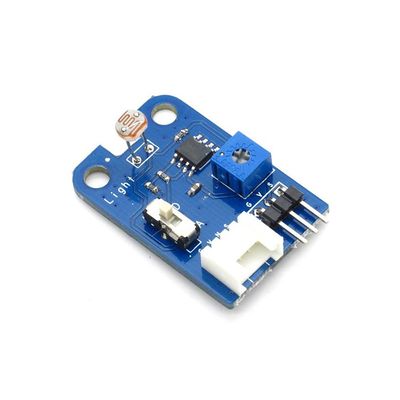Difference between revisions of "Light Sensor Brick"
(→Features) |
(→Specifications) |
||
| Line 18: | Line 18: | ||
==Specifications== | ==Specifications== | ||
| + | {| border="1" | ||
| + | |||
| + | | PCB size||36.0mm X 24.0mm X 1.6mm | ||
| + | |- | ||
| + | | Working voltage||3.3 or 5V DC | ||
| + | |- | ||
| + | | Operating voltage||3.3 or 5V DC | ||
| + | |- | ||
| + | | Compatible interfaces||2.54 3-pin interface and 4-pin Grove interface(1) | ||
| + | |} | ||
==Electrical Characteristics== | ==Electrical Characteristics== | ||
Revision as of 03:52, 27 May 2014
Contents
Overview
Electronic brick of light sensor is mainly used to detect the light intensity in the environment. The control board can get the current light intensity information via analog pins. Generally speaking, the resistance of photoresistor decreases with the increase of the light intensity.
Features
1. Plug and play, easy to use. Compatible with the mainstream 2.54 interfaces and 4-Pin Grove interfaces in the market.

2. With use of M4 standard fixed holes, compatible with M4-standard kits such as Lego and Makeblock.

3. With switch to shift between analog and digital output. Able to read the specific light intensity information (analog) or the over-bright or over-dark information according to the threshold (digital). The adjustable potentiometer is used to set the light intensity threshold. With hysteresis comparator circuit for more stable digital output voltage.

4. Detecting direction can be rotated for better adaption

Specifications
| PCB size | 36.0mm X 24.0mm X 1.6mm |
| Working voltage | 3.3 or 5V DC |
| Operating voltage | 3.3 or 5V DC |
| Compatible interfaces | 2.54 3-pin interface and 4-pin Grove interface(1) |
 Notice
Notice